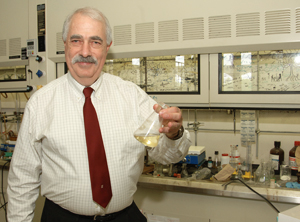- Home
- /
- UAlbany News
- /
- Release
- /
Distinguished Professor Publishes Definitive Book on Garlic and Other Alliums
Contact(s): Catherine Herman (518) 956-8150
 |
Eric Block, one of the nation's leading researchers on the biochemistry of alliums, has spent a lifetime researching garlic, onions, leeks, shallots, chives, and other members of the genus Allium. (Photo Mark Schmidt) |
ALBANY, N.Y. (March 1, 2010) -- Eric Block, one of the nation�s leading researchers on the biochemical makeup of alliums, has spent a lifetime researching and answering the allium questions. Does garlic lower cholesterol? Why do onions make us cry? How was garlic used as a fertility test by the ancient Greeks and Egyptians? The answers to these and many others form the core of his new book, Garlic and Other Alliums: The Lore and the Science (RSC Publishing, Cambridge, UK).
Part excursion into garlic culture and part chemistry textbook, Garlic traces the fascinating past and recent uses of alliums, which include onions, leeks, shallots, chives, and scallions, as well as some 800 species that have not been cultivated for food. Block has sorted fact from fiction based upon detailed scrutiny of historic documents as well as numerous laboratory studies.
Readers learn about early cultivation of garlic and other alliums while being introduced to their biochemical makeup, which prominently features the instantly familiar and pungent sulfur. They will learn how alliums have been portrayed and used in literature, poetry, and the arts, and how they're featured in the world's oldest cookbook (Mesopotamia, 1600-1700 BCE). Block has special insight into the connection garlic science has to the New York Capital Region, based on pioneering research done in the 1940s at Sterling Drug Company in Rensselaer, N.Y.
The book, with a foreword by 1990 Nobel Laureate E.J. Corey, is heavily illustrated with examples of alliums in art, literature, agriculture, and medicine, and includes rare botanical drawings of members of the genus Allium.
Block, the Carla Rizzo Delray Distinguished Professor of Chemistry at the University at Albany, is a specialist in the field of organic chemistry, particularly involving compounds containing sulfur. He is the author of more than 200 scientific papers and three books, holder of five patents, and recipient of a Guggenheim Fellowship.
In 2008, the National Science Foundation (NSF) extended Block's chemistry research funding through 2011, marking 30 years of continuous NSF support. His research has also been funded by the American Heart Association, NATO, and the John Simon Guggenheim Foundation, totaling 43 grants and $5.5 million over a period of 40 years.
Block has been a visiting fellow at Cambridge University and a visiting professor at the Weizmann Institute in Israel and at Harvard. Block, who received his doctorate from Harvard University, has been on the faculty of the University at Albany since 1981.
![]() For more news, subscribe to UAlbany's RSS headline feeds
For more news, subscribe to UAlbany's RSS headline feeds
Educationally and culturally, the University at Albany-SUNY puts "The World Within Reach" for its 18,000 students. An internationally recognized research university with 58 undergraduate majors and 128 graduate degree programs, UAlbany is a leader among all New York State colleges and universities in such diverse fields as public policy, nanotechnology and criminal justice. With a curriculum enhanced by 300 study-abroad opportunities, UAlbany launches great careers. For more information about this globally ranked University, visit www.albany.edu. For UAlbany's extensive roster of faculty experts, visit www.albany.edu/news/experts.shtml.


